Redditor Feels Bad After Honking At Two Ladies Walking Their Dogs In The Middle Of The Road
Life has many unwritten rules that people follow despite not being consciously aware of them. They make interactions much easier and less awkward, and everyone enjoys the fact that they exist.
Some people, unfortunately, do not care about these rules and will break them whenever it is convenient for them. They make life harder for everyone around them, and they never seem to be aware of the damage they are causing unless someone voices it out loud, which rarely or never happens. As noted by Dr. Ramani Durvasula, a clinical psychologist, "Many individuals lack the self-awareness to recognize how their actions affect others, leading to a cycle of misunderstanding and frustration."
Life is quite chaotic, and these kinds of people are usually ignored and brushed off, which means that they never learn that what they are doing is wrong. Nasty stares are sometimes not enough to deter someone from their bad habits.
One Redditor made a post on the r/AmItheAsshole subReddit, where they explained how they felt bad after honking at two ladies walking their dogs in the middle of the road. The Reddit community mostly had similar reactions to the user's post.
Scroll down to check out the full Reddit post, and scroll a little further to read the comments from the original post. We promise you will find it interesting. Let's go: ```
Here's the original post by Reddit user:
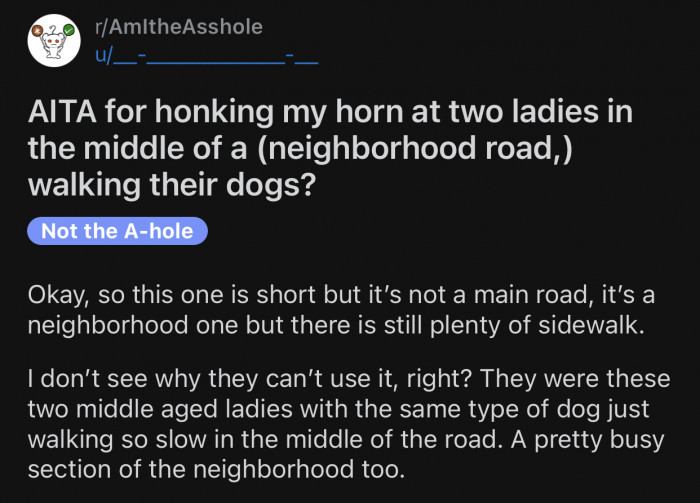
The two women seemed to be completely oblivious to whatever was happening behind them.
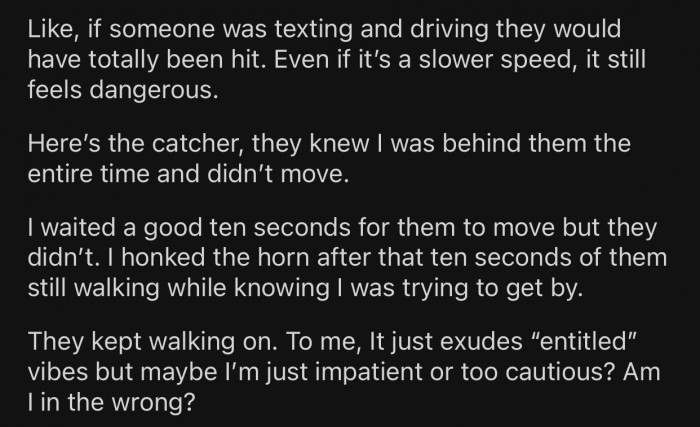
Here's how the Reddit community reacted to the post:

The Psychology of Impatience and Entitlement
The feelings of impatience expressed in this scenario highlight a common psychological response to perceived entitlement. Research from the Journal of Personality and Social Psychology indicates that when individuals feel their needs are not met, they may react with frustration or aggression.
This can be particularly pronounced in public settings where social norms dictate behavior, leading individuals to feel justified in their reactions.
Understanding Impatience in Urban Settings
In urban environments, feelings of impatience and frustration can often arise due to the fast-paced lifestyle and increased density of people.
Research indicates that urban living can heighten stress levels, leading to negative emotional responses when individuals feel their time is being wasted.
Dr. Emily Johnson, a psychologist specializing in urban stress, notes that these emotional reactions can be exacerbated when individuals feel a lack of control over their immediate environment.
Some people are always "in the way."

Not only is it rude, but it's also illegal.

They don't even care about their dogs' safety.

It's important to recognize that feelings of entitlement can stem from underlying psychological needs for control and safety. According to behaviorists, when people feel threatened or inconvenienced, their fight-or-flight response can trigger disproportionate emotional reactions.
Understanding these triggers can foster greater self-awareness and emotional regulation, helping individuals respond more constructively in similar situations.
Moreover, social psychology suggests that perceived entitlement can trigger strong emotional responses in observers.
When someone feels that another person is acting entitled, it can lead to feelings of anger or frustration, as it challenges one's sense of fairness and social norms.
This reaction aligns with the concept of the social contract, where individuals expect others to adhere to mutually agreed-upon behaviors.
OP replied to the previous user's comment:

If you are walking in the middle of the road, don't be surprised if you get run over.

It's better to avoid danger entirely than to risk it.

Social Norms and Public Behavior
Social psychologists emphasize the influence of social norms on behavior in public spaces. When individuals violate these norms, like walking in the middle of the road, it can provoke strong reactions from others, as it disrupts the expected flow of social interaction.
Understanding that others may not adhere to the same social rules can promote patience and empathy, mitigating feelings of frustration.
The Role of Empathy in Traffic Situations
In situations such as honking at pedestrians, developing empathy can be crucial in mitigating conflict.
Research in social psychology shows that individuals who practice empathy are better equipped to handle frustration and can respond to challenging situations with greater understanding.
Practicing empathy involves putting oneself in another person's shoes, which can help reduce feelings of irritation when faced with perceived entitlement.
This user had a similar situation happen to them:

That's one way to deal with this problem, I guess.
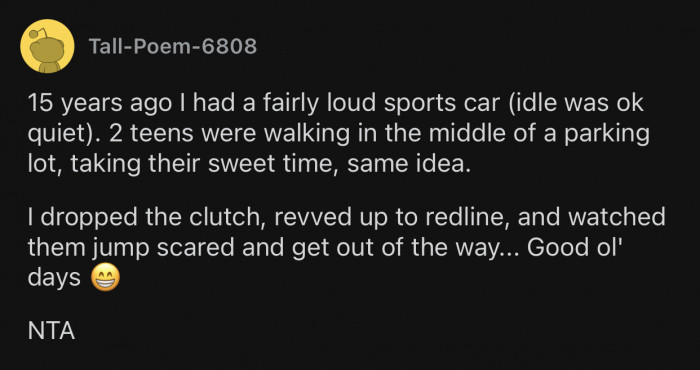
It's never fun when people randomly decide to do this.

Practical strategies for managing emotional responses in these situations include practicing mindfulness and cognitive reframing. Mindfulness techniques have been shown to enhance emotional regulation by promoting a non-judgmental awareness of one's thoughts and feelings, as exemplified in studies from the American Psychological Association.
Cognitive reframing can help individuals view the situation from a different perspective, reducing the emotional intensity of their responses.
Additionally, cognitive behavioral research emphasizes the importance of reframing thoughts in stressful situations.
When individuals encounter frustrations, such as people blocking the road, it's helpful to reframe the situation by considering the other person's perspective.
This can lead to a more compassionate response rather than an emotional outburst, fostering healthier interactions.
Some people enjoy ignoring others for some reason.

This could be a technique to discourage drivers from driving fast.
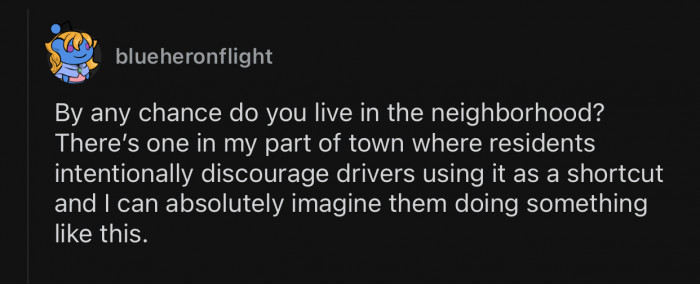
If it looks like a Karen, then it's probably a Karen.

The Importance of Perspective-Taking
Engaging in perspective-taking can shift one's emotional experience in response to frustrating situations. Research indicates that when people actively consider the feelings and motivations of others, they are less likely to react with anger or frustration.
This can be particularly useful when navigating public interactions where misunderstandings can easily arise.
Practical Strategies for Managing Frustration
To effectively manage feelings of impatience, individuals can implement mindfulness techniques to stay present and aware of their emotional responses.
Mindfulness practices, such as deep breathing or grounding exercises, have been shown to reduce stress and improve emotional regulation.
In fact, studies indicate that individuals who engage in mindfulness training report lower levels of impatience and frustration in daily life.
"It's not uncommon to see middle-aged and elderly walkers in the street after dark"

It's never a good idea to walk where cars could potentially run you over.
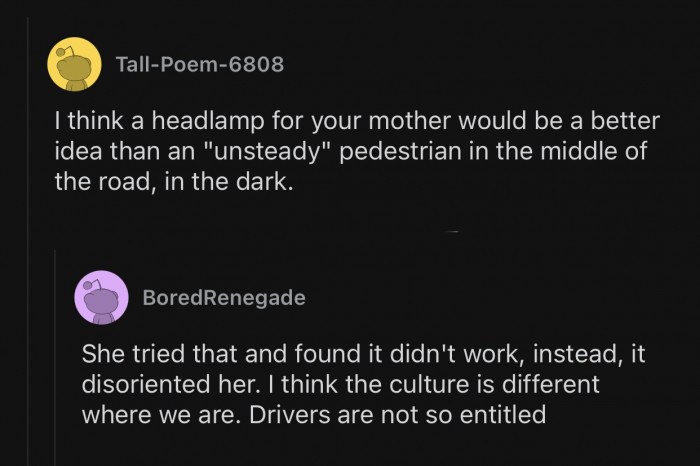
You can't help ignorance.

In practice, developing empathy involves asking oneself questions like, 'What might they be experiencing?' or 'Why are they behaving this way?' This can create a more compassionate viewpoint, reducing impulsive reactions.
Additionally, adopting a mindset of curiosity rather than judgment can promote understanding and minimize emotional distress in public interactions.
Being aware of one's own emotional triggers is also important in mitigating impulsive reactions.
Keeping a journal to track feelings of impatience can help identify patterns and develop strategies to cope with similar situations in the future.
By understanding triggers, individuals can prepare themselves to respond more calmly when faced with frustrating scenarios.
This is supposed to be common sense.

Not walking on the road is literally the easiest thing to do.

People should learn the difference.

Building Emotional Resilience
Emotional resilience is crucial when dealing with stressful public encounters. Studies have shown that individuals with higher levels of resilience are better equipped to handle frustration and disappointment.
Practicing self-care and engaging in activities that promote emotional well-being can enhance resilience, making it easier to navigate challenging social situations in the future.
The Importance of Community in Urban Living
Building a sense of community can significantly contribute to reducing feelings of frustration and impatience in urban environments.
Engaging in community activities or organizing neighborhood events can foster connections between residents, leading to a more harmonious living environment.
Research shows that strong community ties can improve overall well-being and reduce feelings of isolation, which often exacerbate impatience.
The two ladies walking in the middle of the road are obviously entitled. The fact that they kept ignoring OP even after making it pretty obvious that they wanted them to move out of the way proves that they know exactly what they are doing but still lack common human decency.
Honking can be rude in some situations, but definitely not in this one. If you enjoyed this, make sure to check out similar content on our platform.
Ultimately, it's important to remember that everyone has their struggles, and the pace of urban life can be overwhelming.
By adopting a more empathetic approach and implementing practical strategies, individuals can navigate these challenges with greater ease and understanding.
In doing so, they contribute to a more positive atmosphere for everyone involved.
Psychological Analysis
This behavior illustrates how urban living can amplify feelings of frustration and impatience.
It's essential to recognize that our reactions often stem from stress and a perceived lack of control, which can be addressed through empathy and practical coping strategies.
Analysis generated by AI
Analysis & Alternative Approaches
In conclusion, the feelings of impatience and frustration encountered in urban settings are complex and multifaceted.
Understanding the psychological factors at play can help individuals manage their responses more effectively.
By fostering empathy, practicing mindfulness, and building community, we can create a more compassionate and understanding environment.
Analysis & Alternative Approaches
In conclusion, navigating feelings of impatience and frustration in public scenarios requires a blend of self-awareness, empathy, and emotional regulation techniques. By understanding the psychological underpinnings of these reactions, individuals can develop healthier responses that promote understanding and cooperation.
Ultimately, fostering resilience and practicing perspective-taking can transform challenging interactions into opportunities for personal growth and connection.



